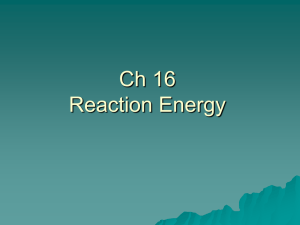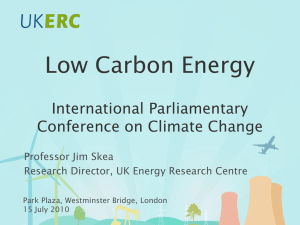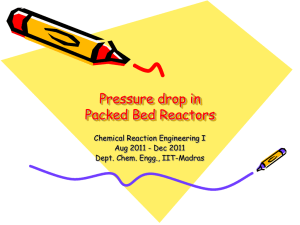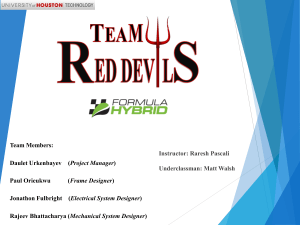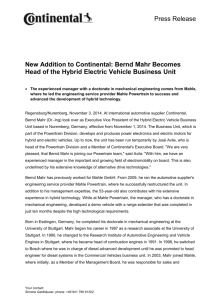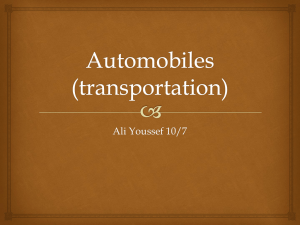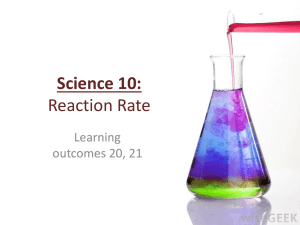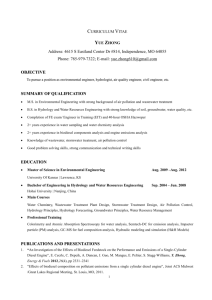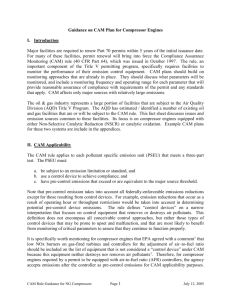press release (Word)
advertisement
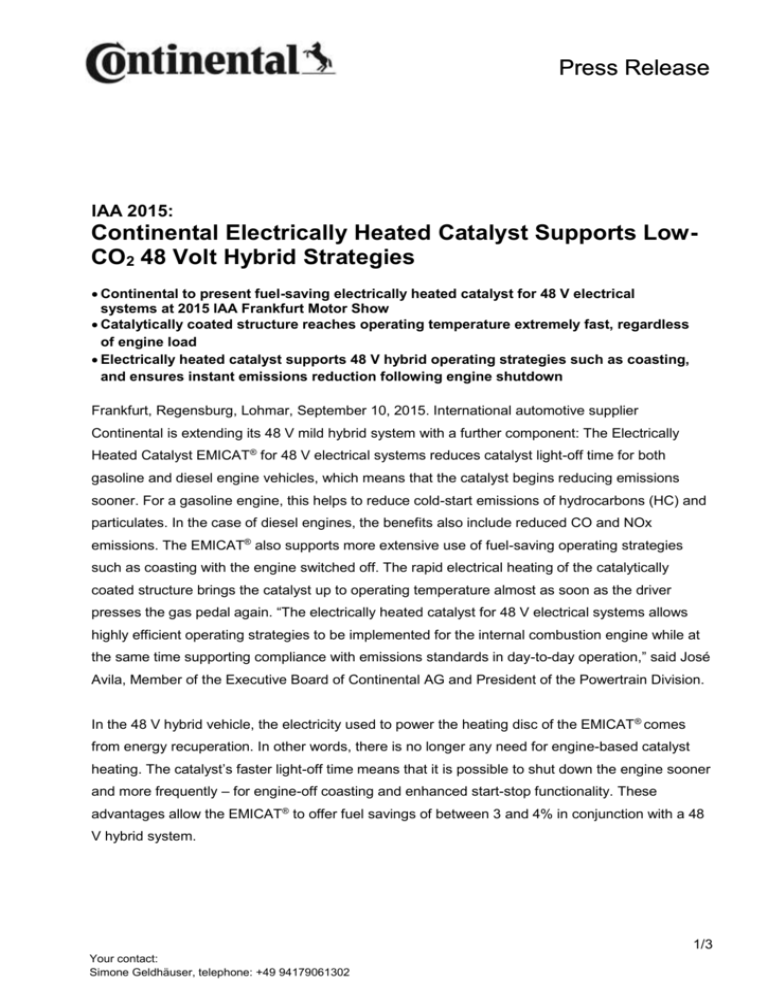
Press Release IAA 2015: Continental Electrically Heated Catalyst Supports LowCO2 48 Volt Hybrid Strategies Continental to present fuel-saving electrically heated catalyst for 48 V electrical systems at 2015 IAA Frankfurt Motor Show Catalytically coated structure reaches operating temperature extremely fast, regardless of engine load Electrically heated catalyst supports 48 V hybrid operating strategies such as coasting, and ensures instant emissions reduction following engine shutdown Frankfurt, Regensburg, Lohmar, September 10, 2015. International automotive supplier Continental is extending its 48 V mild hybrid system with a further component: The Electrically Heated Catalyst EMICAT® for 48 V electrical systems reduces catalyst light-off time for both gasoline and diesel engine vehicles, which means that the catalyst begins reducing emissions sooner. For a gasoline engine, this helps to reduce cold-start emissions of hydrocarbons (HC) and particulates. In the case of diesel engines, the benefits also include reduced CO and NOx emissions. The EMICAT® also supports more extensive use of fuel-saving operating strategies such as coasting with the engine switched off. The rapid electrical heating of the catalytically coated structure brings the catalyst up to operating temperature almost as soon as the driver presses the gas pedal again. “The electrically heated catalyst for 48 V electrical systems allows highly efficient operating strategies to be implemented for the internal combustion engine while at the same time supporting compliance with emissions standards in day-to-day operation,” said José Avila, Member of the Executive Board of Continental AG and President of the Powertrain Division. In the 48 V hybrid vehicle, the electricity used to power the heating disc of the EMICAT ® comes from energy recuperation. In other words, there is no longer any need for engine-based catalyst heating. The catalyst’s faster light-off time means that it is possible to shut down the engine sooner and more frequently – for engine-off coasting and enhanced start-stop functionality. These advantages allow the EMICAT® to offer fuel savings of between 3 and 4% in conjunction with a 48 V hybrid system. 1/3 Your contact: Simone Geldhäuser, telephone: +49 94179061302 -2- Reduced emissions as well with cold exhaust This new 48 V electrical consumer complements the 48 V electrical system of mild hybrid vehicles. In this type of vehicle in particular, switching off the internal combustion engine when it is not really needed is an important strategy for efficient operation. The scope for such a strategy was demonstrated by Continental in an 82-kilometer test drive with the 48 Volt Eco Drive demonstration vehicle, where it was found that the engine could be switched off and decoupled for 22% of the total distance. On the urban sections of the route, featuring 30 different urban cycles, this proportion rose to approximately 30%. Of course, when an engine spends a lot of time switched off to save fuel, it tends to cool down. When operating at low speeds or with frequent overrun cut-off, this is particularly true of diesel engines. In such driving situations, a conventional catalytic converter can stop working. When reducing CO2 emissions, it is important to avoid this conflict of interest. “Frequent engine shutdowns are good for reducing CO 2 emissions, but bad for downstream emissions control, where a continuous supply of hot exhaust gas is required. Using the EMICAT® as part of the 48 V architecture resolves this conflict,” said Rolf Brück, who heads up the Catalyst and Filter Product Line at the Powertrain Division’s Fuel & Exhaust Management Business Unit. An added benefit is that if, during a coasting phase, the driver has a change of mind and decides to accelerate, there is virtually no time lag before the EMICAT® starts reducing emissions again. Intelligent operating principle means lower electricity consumption In a hybrid vehicle too, electricity is a valuable commodity, and the EMICAT® ensures that it is used economically. A short heating cycle (power consumption 3-3.5 kW) is sufficient to get the heated disc and catalytically coated inner structure up to operating temperature, at which point the catalyst can function even with cold exhaust gas. “There is no need to heat the exhaust gas, just the catalyst structure itself. This makes the EMICAT® an efficient system that can be optimally integrated into a 48 V architecture,” said Brück. Continental develops intelligent technologies for transporting people and their goods. As a reliable partner, the international automotive supplier, tire manufacturer, and industrial partner provides sustainable, safe, comfortable, individual, and affordable solutions. In 2014, the corporation generated sales of approximately €34.5 billion with its five divisions, Chassis & Safety, Interior, Powertrain, Tire, and ContiTech. Continental currently employs more than 205,000 people in 53 countries. 2/3 Your contact: Simone Geldhäuser, telephone: +49 94179061302 -3- The Powertrain division develops and produces efficient system solutions for vehicle powertrains to optimize fuel consumption. The comprehensive range of products includes gasoline and diesel injection systems, engine management and transmission control, including sensors and actuators, exhaust aftertreatment technologies, fuel supply systems, and components and systems for hybrid and electric drives. Powertrain employs over 34,500 people worldwide. In 2014, it recorded sales of approximately €6.5 billion. Contact for journalists Simone Geldhäuser External Communications Continental, Powertrain division Siemensstr. 12 / 93055 Regensburg Phone: +49 941 790 61302 E-mail: Simone.Geldhaeuser@continentalcorporation.com This press release is available in the following languages: German, English Links Online press portal: www.continental-presse.com Your contact: Simone Geldhäuser, telephone: +49 94179061302 Online video portal: http://videoportal.continental-corporation.com/
